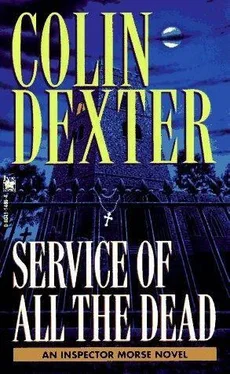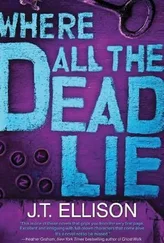Colin Dexter - Service of all the dead
Здесь есть возможность читать онлайн «Colin Dexter - Service of all the dead» весь текст электронной книги совершенно бесплатно (целиком полную версию без сокращений). В некоторых случаях можно слушать аудио, скачать через торрент в формате fb2 и присутствует краткое содержание. Жанр: Триллер, на английском языке. Описание произведения, (предисловие) а так же отзывы посетителей доступны на портале библиотеки ЛибКат.
- Название:Service of all the dead
- Автор:
- Жанр:
- Год:неизвестен
- ISBN:нет данных
- Рейтинг книги:3 / 5. Голосов: 1
-
Избранное:Добавить в избранное
- Отзывы:
-
Ваша оценка:
- 60
- 1
- 2
- 3
- 4
- 5
Service of all the dead: краткое содержание, описание и аннотация
Предлагаем к чтению аннотацию, описание, краткое содержание или предисловие (зависит от того, что написал сам автор книги «Service of all the dead»). Если вы не нашли необходимую информацию о книге — напишите в комментариях, мы постараемся отыскать её.
Service of all the dead — читать онлайн бесплатно полную книгу (весь текст) целиком
Ниже представлен текст книги, разбитый по страницам. Система сохранения места последней прочитанной страницы, позволяет с удобством читать онлайн бесплатно книгу «Service of all the dead», без необходимости каждый раз заново искать на чём Вы остановились. Поставьте закладку, и сможете в любой момент перейти на страницу, на которой закончили чтение.
Интервал:
Закладка:
Chapter Seventeen
Morse rapped briskly on the door marked 'Enquiries', put his head round the door, and nodded 'Hello' to a nice-looking school secretary.
'Can I help you, sir?'
'Headmaster in?'
'Is he expecting you?'
'Doubt it,' said Morse. He walked across the narrow office tapped once on the study door and entered.
Phillipson, headmaster of the Roger Bacon School, was only too pleased to be of help.
Paul Morris, it seemed, had been a music master of the first water. During his short stay at the school, he'd been popular both with his teaching colleagues and with his pupils, and his G.C.E. O-Level and A-Level results had been encouragingly good. Everyone had been mystified – for a start anyway – when he'd left so suddenly, without telling a soul; right in the middle of term, too, on (Phillipson consulted his previous year's diary) 26 October, a Wednesday. He had turned up for school perfectly normally in the morning and presumably gone off, as he often did on Wednesdays, to have lunch at home. And that was the last they'd seen of him. His son, Peter, had left the school just after lessons finished at a quarter to four, and that was the last they'd seen of him. The next day several members of staff had pointed out that both of them were absent from school, and no doubt someone would have gone round to the Morris residence if it hadn't been for a call from the Oxford City Police. It seemed that some anonymous neighbour had tipped them off that Morris and his son had left Kidlington and gone off to join a woman ('I suppose you know all about this, Inspector?') – a Mrs Josephs. Inspector Bell had called personally to see Phillipson and told him that a few enquiries had already been made, and that several of Morris' neighbours had seen a car answering the description of Mrs Josephs' Allegro parked somewhere nearby several times during the previous months. In fact, the police had learned from other sources that in all probability Morris and Mrs Josephs had been lovers for some time. Anyway, Bell had asked Phillipson to soft-pedal the whole thing; make up some story about Morris having to be away for the rest of the term – death of one of his parents – anything he liked. Which Phillipson had done. A temporary stand-in had taken over Morris' classes for the remainder of the autumn term, and a new woman appointed from January. The police had visited the house that Morris had rented furnished, and found that most of the personal effects had been taken away, although for some reason a fair number of books and expensive record-player had been left behind. And that was all, really. Phillipson had heard nothing more from that day to this. To the best of his knowledge no one had received any communication from Morris at all. He had not applied for a reference, and perhaps, in the circumstances, was unlikely to.
Not once had Morse interrupted Phillipson, and when finally he did say something it was totally irrelevant. 'Any sherry in that cupboard, Headmaster?'
Ten minutes later Morse left the headmaster's study and leaned over the young secretary's shoulder.
'Making out a cheque for me, miss?'
'"Mrs"; Mrs Clarke.' She wound the yellow cheque from the typewriter carriage, placed it face downwards on her desk, and glared at Morse defiantly. His lack of manners when he'd come in had been bad enough, but-
'You look pretty when you're cross,' said Morse.
Phillipson called her through to his study. 'I've got to go out, Mrs Clarke. Take Chief Inspector Morse along to the first-year-sixth music group, will you? And wash up these glasses when you get back, please.'
Tight-lipped and red-cheeked, Mrs Clarke led the way along the corridors and up to the music-room door. 'In there,' she said.
Morse turned to face her and laid his right hand very gently on her shoulder, his blue eyes looking straight into hers. 'Thank you, Mrs Clarke,' he said quietly. 'I'm awfully sorry if I made you angry. Please forgive me.'
As she walked back down the steps, she felt suddenly and marvellously pleased with life. Why had she been so silly? She found herself wishing that he would call her back about something. And he did.
'When do the staff get their cheques, Mrs Clarke?'
‘On the last Friday in the month. I always type them the day before.'
'You weren't typing them just now, then?'
'No. We're breaking up tomorrow, and I was just typing an expenses cheque for Mr Phillipson. He had a meeting in London yesterday.'
'I hope he's not on the fiddle.'
She smiled sweetly. 'No, Inspector. He's a very nice man.'
'You're very nice, too, you know,' said Morse.
She was blushing as she turned away, and Morse felt inordinately envious of Mr Clarke as he watched the secretary's legs disappearing down the stairs. Last Friday in the month, she'd said. That would have been 28 October, and Morris had left two days before his cheque was due. Very strange!
Morse knocked on the music-room door and entered.
Mrs Stewart stood up immediately and made as if to turn off the record-player; but Morse held up his right hand, waved it slightly, and sat down on a chair by the wall. The small class was listening to Fauré's Requiem; and with an almost instant ecstasy Morse closed his eyes and listened again to the ethereal sweep of the 'In Paradisum': aeternam habeas requiem… 'that thou mayest have eternal rest'… Too quickly the last notes died away into the silence of the room, and it occurred to Morse that rather too many people had all too recently had a premature dose of that eternal rest thrust forcibly upon them. The score stood at three at the minute; but he had a grim foreboding that soon it might be four.
He introduced himself and his purpose, and was soon surveying the seven girls and the three boys who were in the first year of their A-Level music course. He was making enquiries about Mr Morris; they'd all known Mr Morris; there were various business matters which had to be cleared up, and the police weren't sure where Mr Morris had gone to. Did any of them know anything at all about Mr Morris that might just possibly be of any help? The class shook their heads, and sat silent and unhelpful. So Morse asked them a lot more questions, and still they sat silent and unhelpful. But at least two or three of the girls were decidedly decorative – especially one real honey at the back whose eyes seemed to flash the inner secrets of her soul across the room at him. Morris must have looked at her lustfully just once in a while? Surely so…
But he was getting nowhere slowly, that was obvious; and he changed his tactics abruptly. His target was a pallid-looking, long-haired youth in the front row. 'Did you know Mr Morris?'
'Me?' The boy swallowed hard. 'He taught me for two years, sir.'
'What did you call him?'
'Well, I – I called him "Mr Morris".' The rest of the class smirked silently to each other, as if Morse must be a potential idiot.
'Didn't you call him anything else?'
'No.'
'You never called him "sir"?'
'Well, of course. But- '
'You don't seem to realise the seriousness of this business, lad. So I'll have to ask you again, won't I? What else did you call him?'
'I don't quite see what you mean.'
'Didn't he have a nickname?'
'Well, most of the teachers- '
'What was his?'
It was one of the other boys who came to the rescue. 'Some of us used to call him "Dapper".'
Morse directed his gaze towards the new voice and nodded wisely. 'Yes. So I've heard. Why was it, do you think?'
It was one of the girls now, a serious-looking soul with a large gap between her front teeth. 'He alwayth drethed very nithely, thir.' The other girls tittered and twittered amongst themselves, and nudged each other knowingly.
Читать дальшеИнтервал:
Закладка:
Похожие книги на «Service of all the dead»
Представляем Вашему вниманию похожие книги на «Service of all the dead» списком для выбора. Мы отобрали схожую по названию и смыслу литературу в надежде предоставить читателям больше вариантов отыскать новые, интересные, ещё непрочитанные произведения.
Обсуждение, отзывы о книге «Service of all the dead» и просто собственные мнения читателей. Оставьте ваши комментарии, напишите, что Вы думаете о произведении, его смысле или главных героях. Укажите что конкретно понравилось, а что нет, и почему Вы так считаете.












